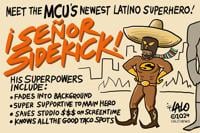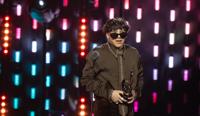
Art by Lalo Alcaraz
The Marvel Cinematic Universe (MCU) has made strides in diversity over the years, with films like “Black Panther” and “Shang-Chi and the Legend of 10 Rings,” but it still faces challenges with Latino representation. While the MCU has introduced a range of characters from diverse backgrounds, Latino characters continue to be underdeveloped or relegated to side plots.
Most recently the trailer for “Captain America: Brave New World” was released and teased the Falcon mantle to be taken over by Joaquín Torres, played by U.S.-born Colombian-Mexican actor Danny Ramirez. In “The Falcon and The Winter Soldier,” Torres is a former United States Air Force lieutenant and intelligence officer who is also Sam Wilson’s friend. His role was seemingly small, although that might change now that Anthony Mackie is supposed to embrace his role as the new Captain America.
Historically, Latino characters in the MCU have been relatively scarce. When they do appear, they're often in supporting roles or minor parts rather than leading positions. For example, in the Marvel Cinematic Universe’s “Ant-Man” (2015), Luis, portrayed by actor Michael Peña, is a character who straddles the line between endearing comic relief and a potentially problematic stereotype. On one hand, Luis is a beloved character, known for his enthusiastic storytelling, loyal friendship and undeniable charisma. On the other hand, some aspects of his portrayal are a formulaic representation of Latinos.
Peña’s immense charisma makes him a beloved figure among fans However, his character’s exaggerated mannerisms and accent can be seen as a clichéd portrayal of Mexicans as comedic sidekicks rather than complex individuals. While he adds fun to the film, his character highlights the challenge the MCU faces of balancing entertaining portrayals without typecasting and stereotypical clichés.
The Marvel Cinematic Universe has attempted to rectify this issue to some extent in recent years. America Chavez, portrayed by Xochitl Gomez in “Doctor Strange in the Multiverse of Madness,” had significant box office potential. However, her character's storyline was limited, reducing her to a sidekick role and missing an opportunity for deeper development.
The lack of Latino representation is not just a problem in front of the camera but behind it as well. The MCU has been criticized for not having enough Latino writers, directors and producers who can bring authentic perspectives and experiences to the storytelling process. This impacts the authenticity of Latino representation, as it can lead to a lack of depth and accuracy in the portrayal of Latino culture and experiences.
One notable exception to this is the casting of actor Tenoch Huerta as Namor, the main antagonist in “Black Panther’s” 2022 sequel, “Wakanda Forever.” The filmmakers drew heavily from various Mesoamerican cultures and interwove Indigenous culture into mainstream superhero films. Unlike the traditional depiction of Namor as a character from the fictional underwater kingdom of Atlantis, Huerta’s casting reimagined him as the leader of Talokan, a Mesoamerican-inspired civilization. Namor’s character, however, failed to reappear in any future MCU films or shows, which many speculated to have been connected to his legal troubles.
While not technically from the same production company, Miles Morales, the Afro-Puerto Rican Spider-Man in the Spider-Verse film trilogy, is widely considered to be part of the MCU canon. Miles Morales stands out as a well-crafted Afro-Latino character who stays true to his comic book origins. Miles’ Afro-Latino identity is central to his character, giving depth to his experiences and worldview.
The films include elements of both African-American and Latinx cultures, reflecting his dual heritage. Miles's family speaks Spanish and makes cultural references to Puerto Rican foods and traditions. However, he remains an exception rather than the norm.
The version of Miles Morales featured in Sony's animated films, such as “Spider-Man: Into the Spider-Verse” and its sequels, also exists in a separate, parallel universe within the Spider-Verse multiverse concept. While both versions of Miles Morales are part of the broader Marvel franchise, they inhabit different realities.
Although the MCU has made some progress in terms of diversity, Latino representation remains an area where there is room for significant improvement. Ensuring that Latino characters are portrayed authentically and given prominent, well-rounded roles requires ongoing effort from both creators and the industry as a whole.











(0) comments
Welcome to the discussion.
Log In
Keep it Clean. Please avoid obscene, vulgar, lewd, racist or sexually-oriented language.
PLEASE TURN OFF YOUR CAPS LOCK.
Don't Threaten. Threats of harming another person will not be tolerated.
Be Truthful. Don't knowingly lie about anyone or anything.
Be Nice. No racism, sexism or any sort of -ism that is degrading to another person.
Be Proactive. Use the 'Report' link on each comment to let us know of abusive posts.
Share with Us. We'd love to hear eyewitness accounts, the history behind an article.